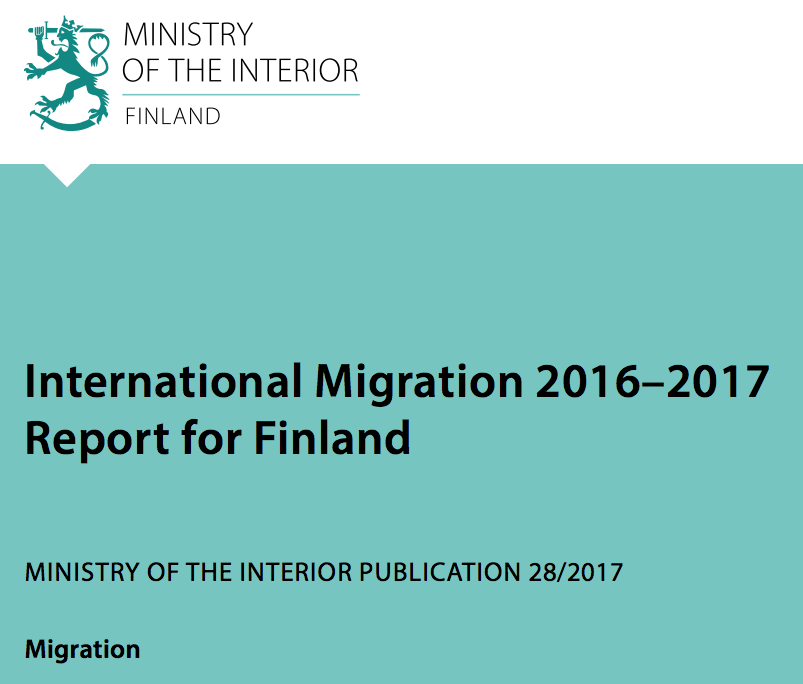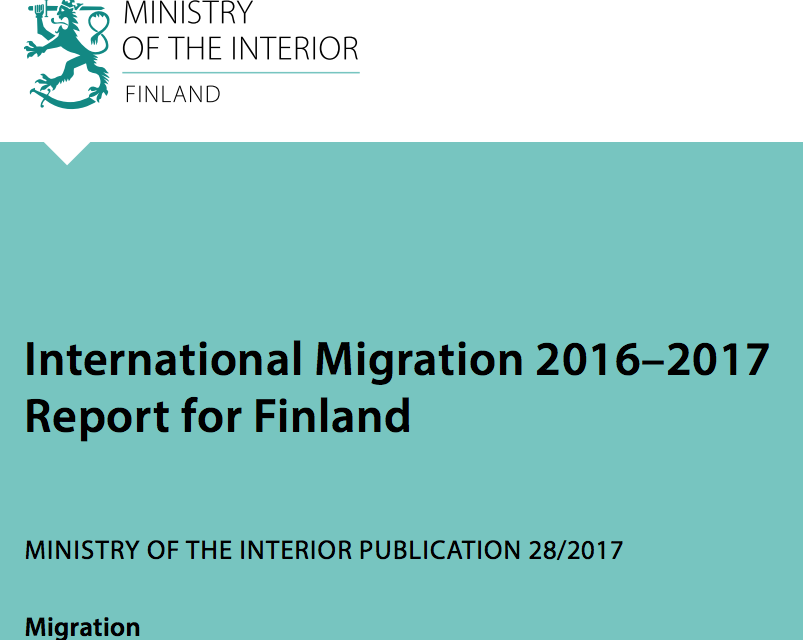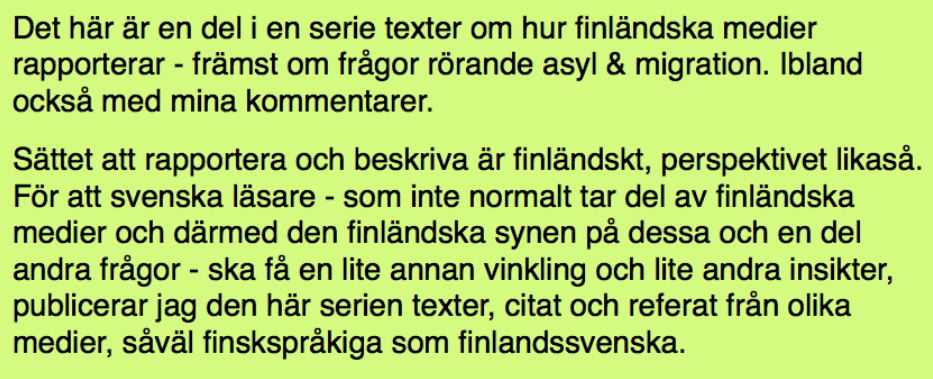 Inrikesministeriet har presenterat Finlands rapport om migration till OECD, en helhetsöversikt över migrationen 2016–2017
Inrikesministeriet har presenterat Finlands rapport om migration till OECD, en helhetsöversikt över migrationen 2016–2017
Ur rapporten:
Det rekordstora antalet asylsökande år 2015 kommer att ha sina effekter inom migrationssektorn ännu flera år. Till följd av den snabbt föränderliga migrationssituationen har statsminister Juha Sipiläs regering genomfört lagreformer som bland annat syftar till en bättre hantering av invandringen och smidigare processer. Också ny lagstiftning bereds i stor omfattning.
———————
Av rapportens medieöversikt framgår att det är frågor om asylpolitik och asyIsökande som mest syns i den offentliga diskussionen medan integration och invandring ur sysselsättningssynvinkel hamnar i skuggan av dem.
———————
Finland främjar arbetskraftsinvandringen och i Finland finns det uppskattningsvis 130.000 utländska arbetstagare varav 80.000 som bor och arbetar i Finland permanent. Regeringens invandringspolitiska program, som håller på att beredas under ledning av inrikesministeriet, siktar i synnerhet på att främja arbetskraftsinvandringen. Den globala konkurrensen om utländska experter och företag är hård, och Finland har som mål att klara sig i denna konkurrens.
 Klicka på textrutan för att läsa rapporten på engelska.
Klicka på textrutan för att läsa rapporten på engelska.
Ur texten:
1.2.2 The family reunification criteria reviewed
The government´s proposal to tighten family reunification criteria was adopted by Parliament in June 2016. The legislative amendments came into force on 1 July 2016. According to these amendments to the Aliens Act, to exercise an alien´s right to family reunification beneficiaries of international or temporary protection are also required to prove that they have sufficient means to live in Finland, regardless of when the family was established. However, exceptions to the application of the income requirement are possible for valid reasons or if the best interest of a child so requires.1.2.3 Residence permits no longer granted on humanitarian grounds
In April 2016, Parliament adopted a legislative amendment to abolish the permit category for residence permits granted on humanitarian grounds. International protection now only means asylum or subsidiary protection.1.2.4 Asylum appeals to be processed more swiftly
Legislative amendments to improve the handling of matters concerning international protection in Finland came into force on 1 September 2016. The aim is to accelerate the processing of asylum appeals. Asylum matters in the administrative branch of the Ministry of Justice include appeals to the administrative court and to the Supreme Administrative Court, as well as legal aid matters. The increase in the number of asylum applications has also significantly increased the number of appeals to Helsinki Administrative Court.
———————–
The period for appealing asylum decisions made by the Finnish Immigration Service used to be 30 days and has now been reduced. Appeals to the administrative court must now be submitted within 21 days of notice of the decision. Both the administrative court and the Supreme Administrative Court must process appeals against decisions concerning international protection urgently. In addition, the provisions concerning the scope of legal aid granted to asylum seekers and the qualification requirements of public legal aid attorneys were amended. These legislative amendments aim to enhance the effectiveness of the appeal procedures, while ensuring legal protection for beneficiaries of international protection. It is also important for those applying for international protection to have a final decision on their case as soon as possible.1.2.5 Amendment of legal aid in cases involving asylum
The provisions of the Aliens Act regarding the special legal regime for the provision of legal aid were amended in an act (646/2016) entered into force on 1 September 2016. Legal aid includes the presence of a legal counsel at the asylum interview only if compelling reasons exist for the presence of such counsel. If the person seeking asylum is under 18 years of age and without a guardian in Finland, legal aid includes the presence of a legal counsel at the asylum interview. At the asylum interview, the applicant’s grounds for international protection are established.1.2.6 New alternatives for detention
New provisions on residence requirements to the Aliens Act entered into force on January. The aim is to expand the range of interim measures applicable to asylum seekers, to reduce the use of detention, to promote the smooth running of the asylum procedure and ensure the deportations of persons whose asylum applications are rejected.Asylum seekers could be ordered to reside in a specific reception centre and to report there between one and four times a day if this was deemed necessary for investigating their right to enter or reside in Finland or for ensuring their removal from the country. The imposition of residence requirements would make asylum seekers easier to locate when processing their application and especially for the purpose of inviting them to an asylum interview. The removal of unsuccessful applicants from the country would also become easier.


